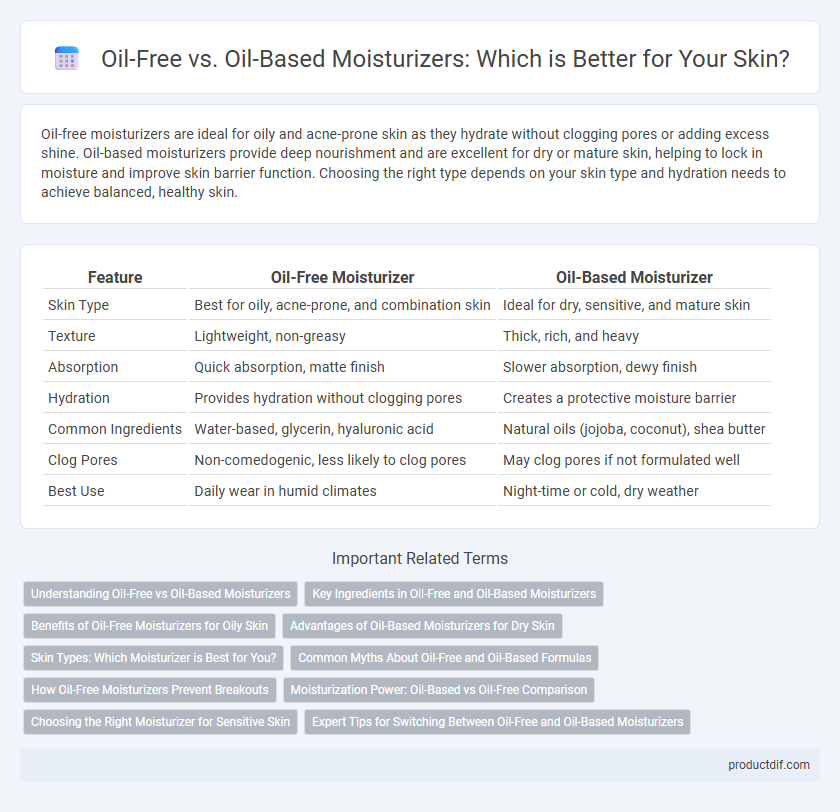Oil-free moisturizers are ideal for oily and acne-prone skin as they hydrate without clogging pores or adding excess shine. Oil-based moisturizers provide deep nourishment and are excellent for dry or mature skin, helping to lock in moisture and improve skin barrier function. Choosing the right type depends on your skin type and hydration needs to achieve balanced, healthy skin.
Table of Comparison
| Feature | Oil-Free Moisturizer | Oil-Based Moisturizer |
|---|---|---|
| Skin Type | Best for oily, acne-prone, and combination skin | Ideal for dry, sensitive, and mature skin |
| Texture | Lightweight, non-greasy | Thick, rich, and heavy |
| Absorption | Quick absorption, matte finish | Slower absorption, dewy finish |
| Hydration | Provides hydration without clogging pores | Creates a protective moisture barrier |
| Common Ingredients | Water-based, glycerin, hyaluronic acid | Natural oils (jojoba, coconut), shea butter |
| Clog Pores | Non-comedogenic, less likely to clog pores | May clog pores if not formulated well |
| Best Use | Daily wear in humid climates | Night-time or cold, dry weather |
Understanding Oil-Free vs Oil-Based Moisturizers
Oil-free moisturizers are formulated without oils, making them ideal for oily or acne-prone skin by providing hydration without clogging pores. Oil-based moisturizers contain natural or synthetic oils that create a barrier to lock in moisture, beneficial for dry or sensitive skin types needing extra nourishment. Understanding the skin's specific needs helps in choosing between lightweight, non-comedogenic hydration and richer, emollient protection.
Key Ingredients in Oil-Free and Oil-Based Moisturizers
Oil-free moisturizers primarily feature water-based ingredients such as glycerin and hyaluronic acid, which provide lightweight hydration without clogging pores. Oil-based moisturizers contain emollients like jojoba oil, shea butter, and squalane, offering deep nourishment and enhanced skin barrier protection. Both formulations use antioxidants and vitamins like vitamin E to boost skin health, but their differing oil content determines suitability for various skin types.
Benefits of Oil-Free Moisturizers for Oily Skin
Oil-free moisturizers offer significant benefits for oily skin by providing hydration without clogging pores or causing excess shine. These formulations often contain lightweight ingredients such as hyaluronic acid and glycerin, which absorb quickly and help regulate sebum production. Using oil-free moisturizers reduces the risk of acne breakouts and maintains a balanced, matte complexion throughout the day.
Advantages of Oil-Based Moisturizers for Dry Skin
Oil-based moisturizers excel in providing intense hydration by creating a protective barrier that locks in moisture, making them ideal for dry skin. They contain nourishing ingredients like natural oils and emollients that help repair the skin's lipid barrier, preventing water loss and improving skin elasticity. Their rich texture also soothes flakiness and irritation, delivering long-lasting comfort and enhanced skin softness.
Skin Types: Which Moisturizer is Best for You?
Oil-free moisturizers are ideal for oily and acne-prone skin as they hydrate without clogging pores, reducing the risk of breakouts. Oil-based moisturizers provide intense hydration and are better suited for dry and mature skin, helping to restore the skin's natural barrier and retain moisture for longer periods. Understanding your skin type--whether oily, dry, combination, or sensitive--ensures you choose the most effective moisturizer to maintain balanced, healthy skin.
Common Myths About Oil-Free and Oil-Based Formulas
Oil-free moisturizers are often misunderstood as being less hydrating or unsuitable for dry skin, but they effectively provide moisture without clogging pores, making them ideal for oily or acne-prone skin. Conversely, oil-based moisturizers are falsely believed to cause breakouts, while their natural oils can actually support skin barrier repair and offer deeper hydration for dry or mature skin types. Both formulas serve unique skin needs, with ingredient selection and skin type compatibility playing crucial roles in effective skincare outcomes.
How Oil-Free Moisturizers Prevent Breakouts
Oil-free moisturizers prevent breakouts by minimizing pore clogging, as they do not contain heavy oils that can trap dirt and bacteria on the skin. Their lightweight, non-comedogenic formulas allow the skin to breathe and regulate natural oil production, reducing excess sebum that commonly causes acne flare-ups. Many oil-free moisturizers also include ingredients like salicylic acid or niacinamide, which help to control inflammation and promote clearer skin.
Moisturization Power: Oil-Based vs Oil-Free Comparison
Oil-based moisturizers provide intense hydration by creating a barrier that locks in moisture, making them ideal for dry or mature skin. Oil-free moisturizers offer lightweight hydration and quicker absorption, suitable for oily or acne-prone skin types. Comparing moisturization power, oil-based formulas excel in long-lasting moisture retention, whereas oil-free options prioritize non-greasy, breathable hydration.
Choosing the Right Moisturizer for Sensitive Skin
Oil-free moisturizers are ideal for sensitive skin prone to acne and irritation because they reduce the risk of clogged pores and inflammation, offering lightweight hydration without added oils. In contrast, oil-based moisturizers provide intense nourishment and barrier protection, making them suitable for sensitive skin that is dry or lacks natural oils. Selecting the right moisturizer depends on skin type and sensitivity, with oil-free formulas preferred for oily or acne-prone sensitive skin, while oil-based options benefit dry, sensitive complexions needing extra moisture.
Expert Tips for Switching Between Oil-Free and Oil-Based Moisturizers
Switching between oil-free and oil-based moisturizers requires assessing your skin type and environmental factors; oil-free moisturizers suit oily or acne-prone skin by providing hydration without clogging pores, while oil-based options benefit dry or mature skin by delivering intense moisture and barrier protection. Experts recommend patch testing new products and gradually introducing them to minimize irritation or breakouts. Incorporating antioxidants or hyaluronic acid alongside moisturizers enhances skin health regardless of the formula choice.
Oil-free moisturizer vs Oil-based moisturizer Infographic

 productdif.com
productdif.com